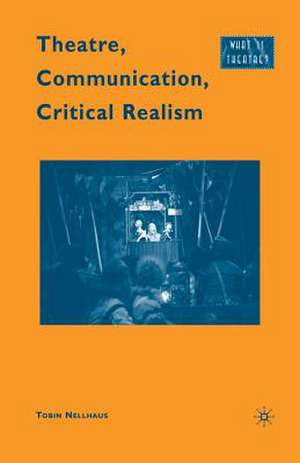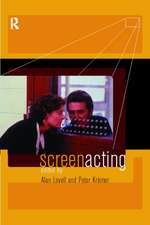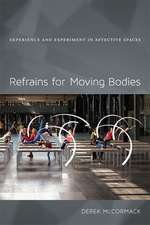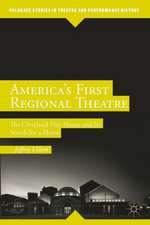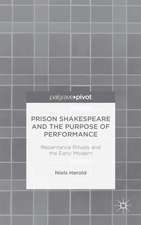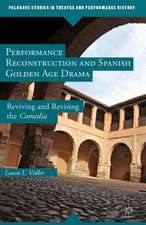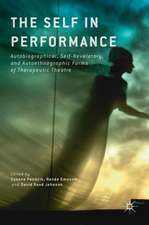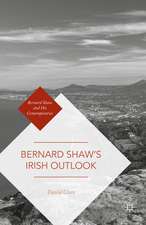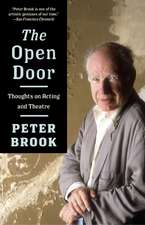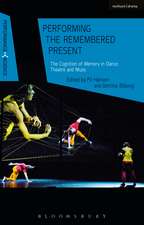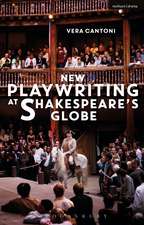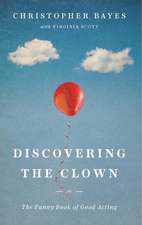Theatre, Communication, Critical Realism: What is Theatre?
Autor T. Nellhausen Limba Engleză Paperback – 18 aug 2010
| Toate formatele și edițiile | Preț | Express |
|---|---|---|
| Paperback (1) | 297.55 lei 3-5 săpt. | |
| Palgrave Macmillan US – 18 aug 2010 | 297.55 lei 3-5 săpt. | |
| Hardback (1) | 302.84 lei 3-5 săpt. | |
| Palgrave Macmillan US – 18 aug 2010 | 302.84 lei 3-5 săpt. |
Preț: 297.55 lei
Nou
Puncte Express: 446
Preț estimativ în valută:
56.93€ • 59.76$ • 47.26£
56.93€ • 59.76$ • 47.26£
Carte disponibilă
Livrare economică 20 martie-03 aprilie
Preluare comenzi: 021 569.72.76
Specificații
ISBN-13: 9781349384938
ISBN-10: 1349384933
Pagini: 237
Ilustrații: IX, 237 p.
Dimensiuni: 140 x 216 x 13 mm
Greutate: 0.29 kg
Ediția:1st ed. 2010
Editura: Palgrave Macmillan US
Colecția Palgrave Macmillan
Seria What is Theatre?
Locul publicării:New York, United States
ISBN-10: 1349384933
Pagini: 237
Ilustrații: IX, 237 p.
Dimensiuni: 140 x 216 x 13 mm
Greutate: 0.29 kg
Ediția:1st ed. 2010
Editura: Palgrave Macmillan US
Colecția Palgrave Macmillan
Seria What is Theatre?
Locul publicării:New York, United States
Cuprins
Introduction Philosophy, History, Theatre Orality, Literacy and Early Theatre Embodiment, Agency, and Performance Strategies Social Ontology, (Meta)theatricality, and the History of Communication Conclusion: New Media, Old Problems
Recenzii
'The author explains why major shifts in theater history have tended to follow revolutions in communication - from orality to writing, to print, to electronics...Highly recommended.' - CHOICE
"Tobin Nellhaus's Theatre, Communication, Critical Realism is a thought-provoking addition to the literature on theatre historiography.The central claim is simply stated: changes in a culture's communication structures cause shifts in theatrical practice. Nellhaus's approach, though, is far from ordinary; he critiques foundational assumptions of historical theory and offers a new and useful method with which to question agency, structure, and causality. His case for this new perspective is solid, and its applications are well-demonstrated and clearly presented." - Theatre Journal
"Nellhaus's book is a clear-headed, compelling and important addition to our understanding of the causes of historical change and the intersection of philosophy, theatre and communication theory. It offers a unique and productive perspective on a complex and difficult topic and renders it in a provocative and readable form." - Contemporary Theatre Review
'Theater, Communication, Critical Realism cuts to the root of many of our current confusions as a discipline. Chief among its virtues are Nellhaus's critiques of two of our primary scholarly orientations, technological determinism and social constructionism.' Bruce McConachie, author of Engaging Audiences: A Cognitive Approach toSpectating in the Theatre
'The first book that takes an explicitly critical realist approach to theater studies, Theater, Communication, Critical Realism provides a compelling articulation of critical realism within an embodied dynamic that is often found wanting elsewhere . . . One encounters here, among other things, sophisticated case analyses of theater history that at the same time suggest paradigmatic shifts in the practices of theater historiography; a provocative deployment of recent discoveries made in cognitive sciences such as those on 'image schemas' in the light of critical realism that historicizes the question of experience, possibilities of knowledge, and conditions of agency; and a highly original theory of metatheatricality that is about the socio-culturally specific structural origins of historical changes in theater as in society, i.e., about the ontological condition of social change and the theatrical nature of such changes . . . Charged with an invigorating critical rigor, this book makes an important contribution to the fields of theater studies, critical theory, and cultural historiography in the midst of paradigmatic shifts. This book is also a timely contribution to the humanistic studies' quest for relevancy in the midst of another round of revolutionary changes of communication structures with unforeseeable consequences.' Haiping Yan, Professor in Theatre Studies, Cornell University and author of Chinese Women Writers and the Feminist Imagination, 1905-1948
'Written by the most formidable and articulate spokesperson for critical realism in theater studies, this work is astute, provocative, and absorbing.' David Krasner, Associate Professor in Performing Arts, Emerson College
"Tobin Nellhaus's Theatre, Communication, Critical Realism is a thought-provoking addition to the literature on theatre historiography.The central claim is simply stated: changes in a culture's communication structures cause shifts in theatrical practice. Nellhaus's approach, though, is far from ordinary; he critiques foundational assumptions of historical theory and offers a new and useful method with which to question agency, structure, and causality. His case for this new perspective is solid, and its applications are well-demonstrated and clearly presented." - Theatre Journal
"Nellhaus's book is a clear-headed, compelling and important addition to our understanding of the causes of historical change and the intersection of philosophy, theatre and communication theory. It offers a unique and productive perspective on a complex and difficult topic and renders it in a provocative and readable form." - Contemporary Theatre Review
'Theater, Communication, Critical Realism cuts to the root of many of our current confusions as a discipline. Chief among its virtues are Nellhaus's critiques of two of our primary scholarly orientations, technological determinism and social constructionism.' Bruce McConachie, author of Engaging Audiences: A Cognitive Approach toSpectating in the Theatre
'The first book that takes an explicitly critical realist approach to theater studies, Theater, Communication, Critical Realism provides a compelling articulation of critical realism within an embodied dynamic that is often found wanting elsewhere . . . One encounters here, among other things, sophisticated case analyses of theater history that at the same time suggest paradigmatic shifts in the practices of theater historiography; a provocative deployment of recent discoveries made in cognitive sciences such as those on 'image schemas' in the light of critical realism that historicizes the question of experience, possibilities of knowledge, and conditions of agency; and a highly original theory of metatheatricality that is about the socio-culturally specific structural origins of historical changes in theater as in society, i.e., about the ontological condition of social change and the theatrical nature of such changes . . . Charged with an invigorating critical rigor, this book makes an important contribution to the fields of theater studies, critical theory, and cultural historiography in the midst of paradigmatic shifts. This book is also a timely contribution to the humanistic studies' quest for relevancy in the midst of another round of revolutionary changes of communication structures with unforeseeable consequences.' Haiping Yan, Professor in Theatre Studies, Cornell University and author of Chinese Women Writers and the Feminist Imagination, 1905-1948
'Written by the most formidable and articulate spokesperson for critical realism in theater studies, this work is astute, provocative, and absorbing.' David Krasner, Associate Professor in Performing Arts, Emerson College
Notă biografică
TOBIN NELLHAUS, Librarian for Performing Arts, Media and Philosophy at Yale University, USA.
